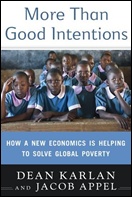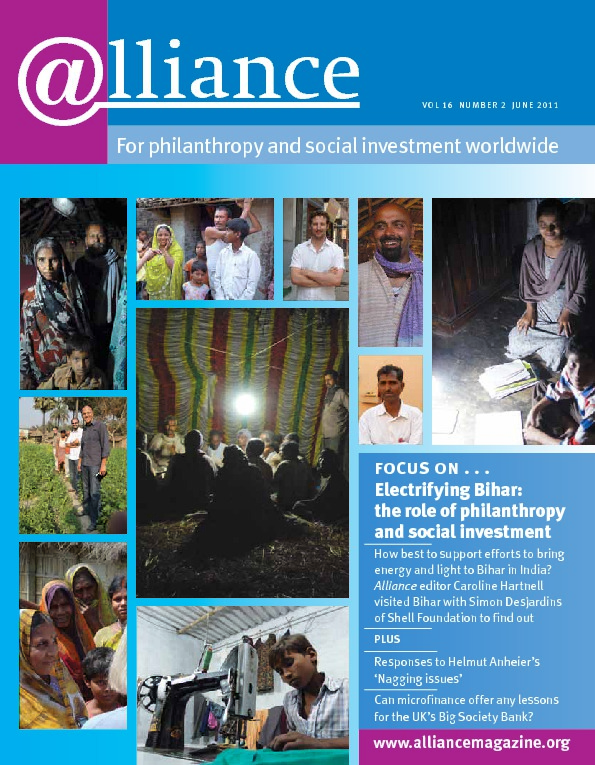 The publisher’s gushing blurb, suggesting that Dean Karlan has developed ‘an entirely new approach’ to making aid effective, may embarrass the economist in years to come, but nonetheless this is an important book. First, through a series of case studies the book illustrates what most development practitioners know and many funders forget: one size does not fit all. Second, in seeking to explain why this is the case, Karlan and Appel savage the ‘before and after’ approach to evaluation: if we don’t measure, we’re guessing – and if we don’t randomize, we can’t attribute.
The publisher’s gushing blurb, suggesting that Dean Karlan has developed ‘an entirely new approach’ to making aid effective, may embarrass the economist in years to come, but nonetheless this is an important book. First, through a series of case studies the book illustrates what most development practitioners know and many funders forget: one size does not fit all. Second, in seeking to explain why this is the case, Karlan and Appel savage the ‘before and after’ approach to evaluation: if we don’t measure, we’re guessing – and if we don’t randomize, we can’t attribute.
They are not afraid to challenge the most cherished assumptions: for instance, that making people pay for a bed net will automatically make them value it more than if they receive it free. They also provide an honest critique of microcredit. It is refreshing to have a populist economist pointing out that microfinance loans are often repaid by further loans, that there are very few genuine entrepreneurs, and that there is something counter-intuitive in having the ‘dynamic’ paying for the ‘deadbeats’ in group loan schemes.
Don’t get the idea that this is a negative book. Far from it. Dean Karlan is of the school of economists and practitioners who see the world system as essentially sound but in need of a tweak here and there (some of us take the view that such an approach is like reorganizing the Titanic’s deckchairs to get a better view of the iceberg). On this view, if we can understand why people behave as they do, we ought to be able to design interventions to change behaviour and achieve desired development outcomes. Without this understanding there is an inevitable risk of wasting precious aid resources. The key question is not so much ‘what works’ but why it works (or doesn’t work) in a given context. And here Karlan turns to behavioural economics.
The microcredit case-studies, for instance, reveal that poor people use loans for consumption or to pay off other loans; that trustworthy people are more likely to repay their loans than non-trustworthy people; that even though saving is self-evidently good, it is also hard, and problems such as ‘temptation’ get in the way. If these insights seem to be rather obvious and banal, that’s the point. As the authors say, there’s often nothing ‘earth-shattering’ in the facts themselves; it’s understanding how they come about that is valuable. So by sending out a phone text message reminding people of their desire to save, saving rates improve dramatically. Using conditional cash transfers has an equally dramatic impact in terms of encouraging parents to send children to school and keep them there. The point here is not to show how behavioural economics can explain peoples’ choices but how it can be used to try to encourage people to improve those choices. In some cases this is as simple as more effectively ‘selling’ good programmes to the poor.
Underpinning all the case studies, ranging across education, healthcare, HIV/AIDS, water supply and microcredit, is the use of Random Control Trials (RCTs). It is not enough to take a snapshot of project participants before they become our ‘beneficiaries’ and then see what changed by the end of the project – so many external factors can affect the outcome. If we really want to understand what works and why, randomly allocating project services (or variants of services) to some people and not to others is far more effective. The authors’ call for individual donors to expect more from non-profits with regard to providing concrete evidence of impact should resonate with foundations and investors too. This reviewer hopes that foundations will increase funding to the often lengthy and relatively expensive RCTs that could undoubtedly make a real difference to the work of non-profits in the field. Inadequate funding should not be an excuse for failing to test and measure.
A small word of warning: some readers may find the studiedly populist style of this book somewhat grating and the scattered Americanisms (references and language) lazily parochial in a book with global coverage. As for the local colouring of the case studies, especially in Africa, they read at times like the first efforts of a budding travel writer, with clichéd African ‘wide smiles’ and communication breakdowns. However, if some of the encounters in Africa in particular seem almost patronizing, it’s worth passing over these since it is clear that Karlan and Appel are passionate about their work and their mission to make aid more effective in resolving poverty, and their book is a valuable contribution to this cause.
Andrew Kingman is managing director of Eco-MICAIA Ltd. Email andrew@micaia.org
More Than Good Intentions: How a new economics is helping to solve global poverty
Dean Karlan and Jacob Appel Dutton Press $26.95/£16.64
ISBN 9780525951896
To order
http://www.amazon.com


Comments (0)